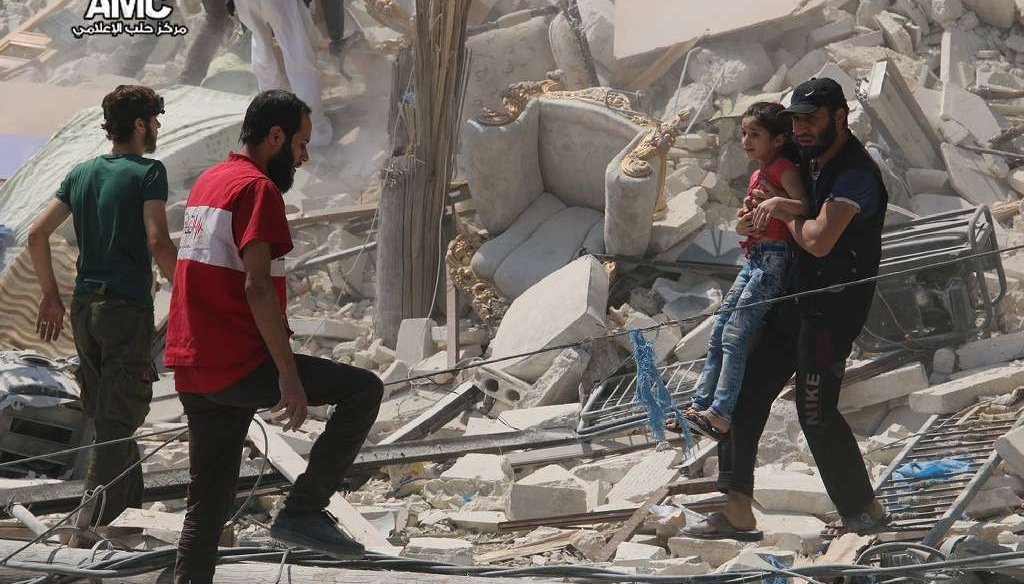Stand up for the facts!
Our only agenda is to publish the truth so you can be an informed participant in democracy.
We need your help.
I would like to contribute

This photo provided by the Syrian anti-government activist group Aleppo Media Center (AMC), shows a Syrian man carrying a girl away from the rubble of a destroyed building after barrel bombs were dropped on the Bab al-Nairab neighborhood in Aleppo, Syria.
Presidential candidates might not be experts on everything, but they are expected to follow the news. So the twittersphere lit up when Libertarian candidate Gary Johnson stumbled on a simple question during an interview on MSNBC’s Morning Joe.
"What would you do, if you were elected, about Aleppo?" asked panelist Mike Barnicle on Sept. 8, 2016.
"About?" Johnson replied.
"Aleppo," Barnicle said.
"And what is Aleppo?" Johnson asked.
"You're kidding," Barnicle said.
"No," Johnson said.
Barnicle explained that Aleppo is in Syria and called it "the epicenter of the refugee crisis."
At that point, the lightbulb went on and Johnson said "Okay, got it. Got it."
Johnson went on to say that Syria "is a mess" and that the only solution is to join with Russia to bring a diplomatic end to the conflict.
Later in the program, host Joe Scarborough pressed Johnson on his memory lapse.
"Do you really think that foreign policy is so insignificant that somebody running for President of the United States shouldn't even know what Aleppo is, where Aleppo is, why Aleppo is so important?" Scarborough said.
"Well, no, I do understand Aleppo, and I -- I understand the crisis that is going on," Johnson replied.
Just in case you (or Johnson) didn’t understand, we decided to help fill in the details.
An Aleppo primer
Aleppo is Syria’s largest city, with about 2.5 million people, at least back in 2011. For the first year of the conflict, Aleppo remained peaceful. Then, in July 2012, a variety of rebel units attempted to wrest control of the city from the government and the battle for Aleppo hasn’t stopped since.
Particularly in the western neighborhoods where insurgents dug in, the city lies in tatters.
The violence reached new heights early in 2016 when the government, backed by a Russian air strikes, hammered rebel positions. Tens of thousands of refugees fled the war zone, many of them seeking sanctuary in Turkey.
In August, the United Nations High Commission on Refugees described a dire situation.
"Humanitarian access to the estimated 250,000 to 275,000 civilians trapped in the eastern part of the city has been cut off since early July, after fighting closed the main access route in and out of the area," the agency wrote. "Heavy fighting in recent days has also cut off the main access route used by UN agencies to deliver aid to civilians in the western part of the city, raising fears that civilians throughout the city are effectively cut off from any assistance."
In a troubling turn, recent reports accuse government helicopters of dropping chlorine barrel bombs on an Aleppo suburb.
Syria denies the allegations. A U.N. panel concluded that Syria has used chlorine in previous attacks.
A grim forecast
Control of Aleppo has emerged as key objective for the government of Syrian President Bashar al-Assad. A victory there would deal a crippling blow to the opposition.
The broader regional conflict infuses the battle. An Iraqi Shiite militia said it has sent 1,000 fighters to bolster the government attacks. Thousands of soldiers from Iran’s Revolutionary Guards have already joined the fight on behalf of Assad in Syria.
The Islamic State group, often called ISIS or ISIL, took advantage of the turmoil early on and established areas of territorial control inside Syria. While many parties on both sides in the civil war oppose ISIS, the fight to unseat the Sunni fundamentalist group has often fractured as forces navigate to advance their own positions.
Secretary of State John Kerry is pressing his Russian counterpart to back a new truce. There are conflicting reports on his progress. The Russian government has said talks have reached a key pivot point, but the American State Department countered that many fundamental differences remain.
The last cease-fire held for a short while before collapsing.
Johnson explains
After the MSNBC interview, Johnson offered this statement:
"This morning, I began my day by setting aside any doubt that I’m human," Johnson said. "Yes, I understand the dynamics of the Syrian conflict -- I talk about them every day. But hit with 'What about Aleppo?', I immediately was thinking about an acronym, not the Syrian conflict. I blanked. It happens, and it will happen again during the course of this campaign.
"Can I name every city in Syria? No. Should I have identified Aleppo? Yes. Do I understand its significance? Yes."
In fairness, the question about Aleppo came immediately after Johnson had delivered a 30,000-foot critique of Republicans for legislating morality and Democrats for being too fond of big government.
As the old saw has it, failure is the best teacher. We predict that after today, Aleppo is firmly burned into Johnson’s brain.
Our Sources
BBC, Profile: Aleppo, Syria's second city, Feb. 5, 2016
Reuters, Iraq militia fighters join battle for Syria's Aleppo, Sept. 8, 2016
Telegraph, Almost 700 Iranian troops and militia fighters 'killed in Syria' to preserve Bashar al-Assad, May 10, 2016
Bloomberg, Russia Says Syria Meeting Still On as U.S. Casts Doubt, Sept. 7, 2016
UNHCR, Fears grow for Aleppo residents amid latest violence, Aug. 9, 2016














































